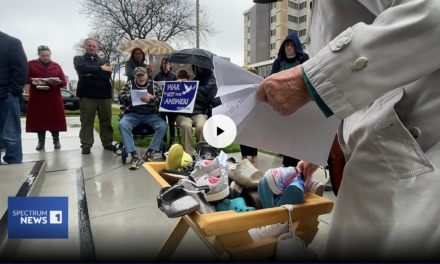Zach Gibson/Getty Images
Even amid the pandemic, House Democrats are keeping a focus on President Donald Trump’s immigration agenda: They passed a bill on Wednesday that would repeal the travel ban on citizens of 13 countries and limit his authority to issue such sweeping bans in the future.
The bill — the No Ban Act, which passed 233-183 — will almost certainly go nowhere in the Republican-led Senate, where several Democrat-led immigration bills have languished. But it allows Democrats to contrast themselves with Trump ahead of the presidential election and present themselves as a party that welcomes immigrants, rather than keeping them out.
The bill would also strengthen existing prohibitions on religious discrimination in visa applications, which are guaranteed by the Immigration and Nationality Act (INA). Immigrant advocates have praised the House’s measure as a means of protecting the rights of American Muslims.
Democrats are hopeful that former Vice President Joe Biden will prioritize the legislation should he win the presidential election this fall. He could quickly repeal Trump’s travel bans via executive order, but the bill would provide more lasting protection against such bans in any future administration.
“It’s a very clear signal about what the House Democratic Caucus stands for,” said Tom Jawetz, vice president of immigration policy at the Center for American Progress think tank. “An incoming Biden administration can and should eliminate these bans by the stroke of a pen on day one. But that act itself will not stop a future administration from trying to shape an immigration system in his or her own anti-immigrant, racist image. This bill imposes important procedural and substantive constraints on that authority.”
Another Democrat-led immigration bill also cleared the House Wednesday: The Access to Counsel Act, which passed 231-184, would allow immigrants to contact an attorney or other legal service provider when they are detained by US Customs and Border Protection or US Immigration and Customs Enforcement. Immigrants taken into custody currently do not have any such assurance.
But these bills are only pieces of what should constitute broader immigration reform efforts if Biden assumes the presidency, Rep. Pramila Jayapal, who introduced the Access to Counsel Act, said.
“We’re going to be pushing for comprehensive, humane immigration reform that really addresses the broken pieces of immigration law that we currently have,” she said. “That is absolutely essential.”
The No Ban Act would prevent future travel bans
The No Ban Act would vacate Trump’s existing travel bans on countries his administration deems to be threats to national security, as well as put in place measures to prevent future such bans.
Under the first version of Trump’s travel ban, unveiled in January 2017, citizens of seven majority-Muslim countries, including those who held US green cards and dual US citizenship, were held for questioning for many hours at airports across the country and were denied entry to the US. A de facto “Muslim ban,” the policy appeared to be the execution of Trump’s call on the campaign trail for a “total and complete shutdown” of Muslims entering the US and sparked widespread protests throughout the country.
That ban was amended in the face of court challenges; the version of the ban now in place — the third Trump has issued — was upheld by the US Supreme Court in June 2018. It places restrictions on citizens of Iran, Libya, Somalia, Syria, Yemen, Venezuela, and North Korea who seek to enter the US. Citizens of those countries are barred from obtaining any kind of visas, largely preventing them from entering the US. (Chad was taken off the list of countries subject to the ban after it met the Trump administration’s demands to share information with US authorities that could aid in efforts to vet foreigners.)
The administration expanded the ban in February to also place restrictions on immigrants from six additional nations: Myanmar, Eritrea, Kyrgyzstan, Nigeria, Sudan, and Tanzania. Citizens of those countries can still visit the US and obtain temporary work and student visas, but for the most part, they aren’t allowed to settle in the US permanently.
The No Ban Act would dial back the president’s authority to issue such bans under the Immigration and Nationality Act, which was “not intended to provide carte blanche authority to the president to ban large categories of individuals without justification, or to rewrite immigration laws with which he disagrees,” Chair Jerrold Nadler said on the House floor Wednesday.
The INA currently bans discrimination in the issuance of visas only on the basis of “race, sex, nationality, place of birth and place of residence.” There is no provision prohibiting religious discrimination, which made it more difficult for immigrant advocates to argue that the travel ban was unlawful.
The No Ban Act would amend the current law to require that any travel ban be temporary, based on credible evidence, subject to congressional oversight, and be created only in response to specific actions foreign entities have taken to threaten the US. The bill also states that a ban must also advance a compelling government interest in the least restrictive way possible.
These proposals have been praised by immigration advocates, like those at the National Immigration Law Center, who said they would “ensure that future presidents would not be allowed to issue orders based so clearly on anti-Muslim bias or any other religion-based animus and that every visa applicant would receive individual consideration.”
But the Trump administration has argued that the bill will pose a threat to US national security, divert resources away from cooperating with foreign governments to improve screening, and diminish what has recently been a critical tool for combatting Covid-19. In recent months, Trump has blocked all travelers who have been in China, Iran, Europe, and Brazil within the last 14 days.
“[T]he President’s authority to restrict travel into the United States has been central to the Administration’s ongoing efforts to safeguard the American people against the spread of COVID-19,” the White House said in a statement in March, threatening to veto the bill. “At a minimum, [the bill] would cause dangerous delays that threaten the safety, security, and health of the American people.”
The No Ban Act has a narrow exception that allows the president to institute travel bans during public health crises, including the current pandemic — an exception that Republicans have argued is too narrow.
Rep. Doug Collins, a Republican from Georgia, said Wednesday that Trump’s move to block Chinese nationals at the outset of the pandemic was critical to staving off coronavirus transmission.
“Democrats want to take away the president’s power to keep Americans safe,” he said.
But Jawetz said that the bill was carefully drafted to ensure that no future administration will have its hands tied in responding to public health emergencies. It merely requires that the decision to block broad classes of foreigners be based on sound evidence, preventing “an opportunist administration from using a public health crisis to impose a broader ban” than is necessary, he added.
The Access to Counsel Act affirms basic rights in immigration detention
The Access to Counsel Act was born out of the confusion in the days after the first travel ban was issued in 2017, Jayapal said. At that time, immigrants were detained in airports without the opportunity to hire an attorney. Some immigration officials even pressured green card holders and those with valid visas to sign documents relinquishing their legal status.
Jayapal first introduced the bill in early 2017, but reintroduced it again this year after people of Iranian descent were subjected to similar treatment at the Canadian border. About 200 individuals, including American and Canadian citizens, were held for questioning about their “political views and allegiances” without the opportunity to contact counsel.
“That same set of circumstances kept repeating itself,” Jayapal said. “It’s really about making sure that there is justice in these proceedings.”
The bill would affirm that people detained by immigration officials in airports, at the border, and under other specific circumstances have the right to access legal help, either in person or remotely. They would, however, still have to find a lawyer independently since the bill doesn’t create any obligation on the part of the government to provide counsel or information about how to obtain counsel.
The bill would also prevent officials from persuading people to give up their legal immigration status, place limits on how long people can be detained, and require that officials detain people in the least restrictive setting possible with access to food, water, and restrooms.
While the bill would remove some obstacles to obtaining legal help, it’s likely that many immigrants would still go unrepresented if it becomes law. Especially for migrants with limited English proficiency and those who can’t afford to hire an attorney, it may be a challenge to even identify a lawyer who will take their case. And lawyers aren’t allowed inside the facilities where immigrants are being held for the purposes of soliciting clients.
The bill also wouldn’t help the thousands of immigrants arriving at the southern border who have been rapidly returned to Mexico without the opportunity to consult an attorney under a Trump administration program implemented during the pandemic. Migrants from Mexico, Guatemala, El Salvador, and Honduras are processed in the field rather than inside US Border Patrol stations, and, without so much as a medical exam, are being sent back to Mexico in an average of 96 minutes, the Texas Tribune reported. More than 69,000 migrants have been sent back to Mexico under the new system since March, according to CBP.
Despite the partisan impasse on immigration issues in Congress, lawmakers of both parties agree that people should at least have the right to consult an attorney and that their basic needs should be met in detention, Jayapal said.
But because the bill takes on the president and his immigration policies, Republicans have distanced themselves from the legislation.
“Nobody really denies that you should have access to food, water, and restrooms and [be able] to talk to a lawyer,” Jayapal said.














